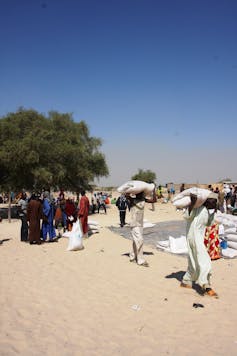David Mickler, University of Western Australia
Nigeria and its neighbours have proposed a regional taskforce to tackle the brutal Boko Haram insurgency, which has waged war in the northeast of the country since 2009. But will it work?
Boko Haram has killed more than 10,000 people and forced more than a million others to flee. It has captured 30,000 square kilometres of Nigerian territory, has reported links to al-Qaeda and has been dubbed “Africa’s ISIS”.
So, where has the plan for a regional taskforce come from? What does it propose to do? And will it have UN Security Council authorisation?
What’s happening in Nigeria?
Nigeria is home to Africa’s largest economy and its largest population. It is also Africa’s largest democracy, albeit a fragile one. But Nigeria has faced an increasingly brazen campaign of violence and terror by Boko Haram.
Attacks occur almost daily on both government and civilian targets, and recent events have raised the stakes. In April 2014, Boko Haram sparked international outrage by kidnapping nearly 300 schoolgirls from Chibok. In January this year, ten-year-old suicide bombers were reportedly used in attacks and militants decimated the people and town of Baga.
Boko Haram has also expanded its attacks into Cameroon, Niger and now Chad. This has made stopping it more than just a Nigerian problem.
The Nigerian government, a leader in African peace and security governance, has been unable to counter this violent challenge. Declaring a state of emergency in three northeastern states, it has deployed under-resourced Nigerian army forces and been accused of extra-judicial killings of suspected insurgents. Its failure to halt attacks has been a source of frustration and criticism.
The crisis even threatens Nigerian democracy. National elections due to have been held on February 14 were postponed for six weeks. The government claims this is due to an inability to securely conduct the poll in the affected states.
Towards a regional response
The Nigerian government has used its regional power and influence to control how Boko Haram features on African and international security agendas. However, it has reluctantly come to accept that it needs external help.

As the Boko Haram insurgency has spread, Nigeria’s neighbours have sought to co-operate to halt its progress. In mid-2014, the search for a regional solution gathered momentum. Representatives from Nigeria and its neighbours in the Lake Chad Basin Commission (LCBC), Chad, Cameroon and Niger, met with counterparts from Benin, France, the US and UK.
Following the Chibok abductions, in May 2014 the UN Security Council added Boko Haram to its list of terrorist groups under travel, financial and weapons sanctions.
In October 2014, the LCBC agreed on a plan to deploy a Multinational Joint Task Force to counter Boko Haram. Under the terms of regional and global security governance concerning the legitimate use of military force, the proposal needed formal authorisation by the African Union and the UN Security Council.
In January, the African Union formally authorised the taskforce for an initial 12-month period. It has called on the Security Council to do the same, and to provide financial and logistical support.
Most recently, the LCBC and partners met in Cameroon in February to hammer out the final operational details.
What would the taskforce look like?
The taskforce would consist of 8700 military, police and civilian personnel. It would conduct co-ordinated military and intelligence operations to prevent Boko Haram’s expansion and to stabilise areas previously under its control. It would also protect civilians, help displaced people to return home and enable some humanitarian assistance.
However, the extent to which neighbouring countries would actually be allowed to operate their forces on Nigerian soil is not clear.
Nigeria’s role in the development of a regional approach has been and remains crucial. As a member of both the African Union Peace and Security Council and the UN Security Council, Nigeria has slowly allowed the issue of Boko Haram onto their agendas – but it has largely directed the international response.
What happens now?
The UN Security Council will now consider the taskforce proposal. This will include sorting out who will pay for the taskforce and logistical issues.
The Security Council will also consider how human rights would be protected in any UN-authorised counter-insurgency campaign against Boko Haram. Many observers have criticised the Nigerian government’s human rights record during the response so far, and the impunity with which abuses have been committed.
The Nigerian government is gearing up for a major operation against the insurgents and claims it can defeat them within the six weeks before the delayed election. The immediate tasks are to contain Boko Haram from spreading into the wider region, and then to begin making inroads into the significant territory under its control to protect vulnerable civilian populations.
There are deeper issues regarding the conditions that have enabled Boko Haram to flourish, which are beyond the mandate and capacity of any regional intervention force. These include political marginalisation and socio-economic underdevelopment in the predominantly Muslim regions of Nigeria’s north, religious radicalisation and wider governance challenges, such as corruption, in the Nigerian polity.
These are issues for the Nigerian people and their governments to address, starting with the rescheduled national elections on March 28.![]()
David Mickler, Lecturer in Foreign Policy and International Relations, University of Western Australia
This article is republished from The Conversation under a Creative Commons license. Read the original article.


